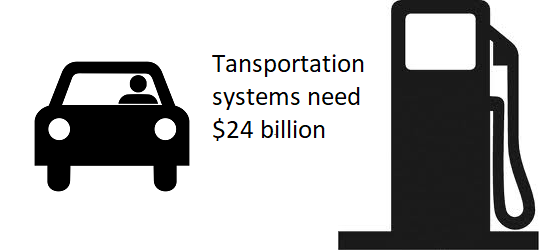Transportation Planners say increase Motor Fuel Tax (MFT), and later change to a vehicle-miles-traveled (VMT) tax
Chicago Metropolitan Agency for Planning. proposal
The Chicago region’s transportation system needs $24 billion over the next three decades just to keep our buses and trains operating in their current condition, but that money is nowhere in sight.
For the near term, the plan calls for an increase of at least 15 cents per gallon in the state’s motor fuel tax (MFT), and indexing the tax to the overall rate of inflation. The current 19-cent rate has been unchanged since 1990.
Similarly, the federal gas tax, set at 18.4 cents per gallon in 1993, should be increased and indexed to an inflationary measure, improving solvency of the federal Highway Trust Fund.
“Over the long term, then, the state and the federal government should replace their MFTs with a user fee that taxes actual use of the system, as with a per-mile road usage charge,” the plan says. This is also commonly known as a vehicle-miles-traveled (VMT) tax or fee.
Full Article
Chicago Transportation Journal, by Richard Wronski, October 11, 2018
The Chicago region’s transportation system needs $24 billion over the next three decades just to keep our highways, buses and trains operating in their current condition, but that money is nowhere in sight, according to the Chicago Metropolitan Agency for Planning.
That’s the dire outlook contained in the agency’s newly approved comprehensive plan, “On to 2050,” which guides transportation investments and outlines regional priorities on development, the environment, the economy, and other issues affecting quality of life.
The new plan, three years in the making, was rolled out Wednesday at an event at Millennium Park attended by an array of public officials, civic leaders and concerned citizens. But unless legislators in Springfield, among others, pay attention to the document’s reasons and recommendations and take action, the status quo won’t change.
On to 2050 covers much ground, which the Chicago Transportation Journal will start to approach these topics with a look at one of its recommendations: increasing the gas tax and replacing it with a “road-usage charge.”
“Systemic shifts are leading to declining revenues, and structural problems make current revenue sources inadequate for maintaining and operating the system,” the plan notes.
For example, revenues generated from the federal and state motor fuel taxes (MFTs) have lost significant purchasing power due to inflation. Meanwhile, average vehicle fuel economy has been rising and vehicle travel has been stagnant, resulting in less fuel consumption.
“These trends will almost certainly result in state MFT (Motor Fuel Tax) revenues dwindling in the upcoming years,” the document states.
To maintain or improve the transportation system, the state and region must rethink current funding formulas and look for new revenues, the plan states.
For the near term, the plan calls for an increase of at least 15 cents per gallon in the state’s motor fuel tax (MFT), and indexing the tax to the overall rate of inflation. The current 19-cent rate has been unchanged since 1990.
Similarly, the federal gas tax, set at 18.4 cents per gallon in 1993, should be increased and indexed to an inflationary measure, improving solvency of the federal Highway Trust Fund.
However, the motor fuel tax no longer reflects the way people travel or the many types of vehicles on the road, the plan notes.
Although fuel efficiency has increased, with environmental and consumer benefits, MFT revenue has dropped. Projections suggest electric vehicles will become a much larger part of the fleet.
“Over the long term, then, the state and the federal government should replace their MFTs with a user fee that taxes actual use of the system, as with a per-mile road usage charge,” the plan says. This is also commonly known as a vehicle-miles-traveled (VMT) tax or fee.
Recently, Republican Gov. Bruce Rauner tried to dirty up Democratic challenger JB Pritzker by claiming Pritzker favored a per-mile road use tax. Pritzker, in fact, said he only favored studying the option.
Politicians in Springfield and Washington, D.C., have long treated the gas tax like kryptonite, fearing that increasing it would be political suicide.
In truth, the price of a gallon of gas fluctuates so much these days that an increase of a few pennies or even a dime would hardly be noticed.
At a public event a couple of years ago at Northwestern University, I asked House Speaker Michael Madigan, the most powerful official in Illinois, if he favored increasing the state gas tax. He said yes.
Has anything changed? No.
— Richard Wronski
